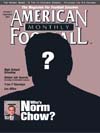AMERICAN FOOTBALL MONTHLY THE #1 RESOURCE FOR FOOTBALL COACHES
Article CategoriesAFM Magazine
|
Does Anyone Really Know Norm Chow?Searching for the identity of college football\'s most intriguing and mysterious offensive coordinatorby: Aaron S. Lee © More from this issue How can a coach that has produced six of the NCAA’s top 12 career passing efficiency leaders in the history of college football go virtually unnoticed for the majority of his 34-year coaching career? How can a coach who has taught two Heisman Trophy winners and a slew of NFL quarterbacks fly under the radar for nearly four decades? How can a coach involved with squads that hold 11 of the top 30 single season passing yardage totals in NCAA history not have been given a head coaching job at some point? After all, few college football fans, if any, have heard of Southern Cal offensive coordinator Norm Chow. And while any football coach worth his whistle may know the name, very few could ident....The full article can only be seen by subscribers. Subscribe today!
|
|
|||||||
| HOME |
MAGAZINE |
SUBSCRIBE | ONLINE COLUMNISTS | COACHING VIDEOS |
Copyright 2026, AmericanFootballMonthly.com
All Rights Reserved





